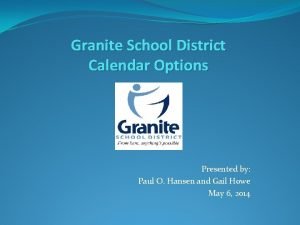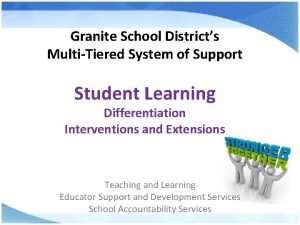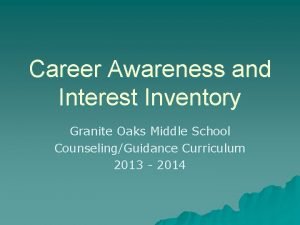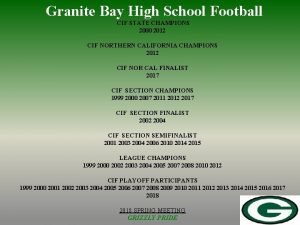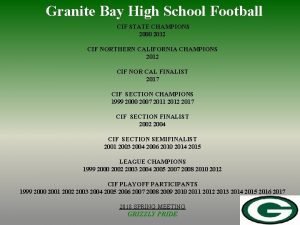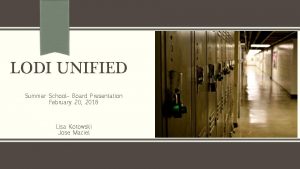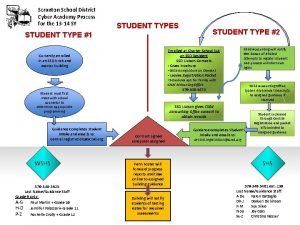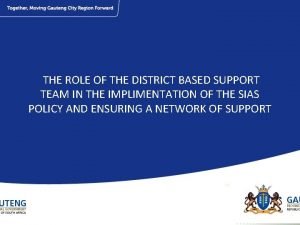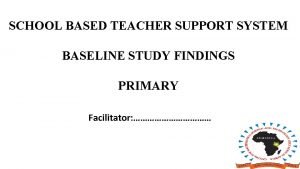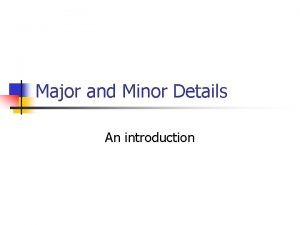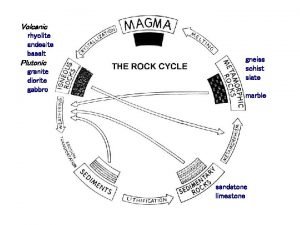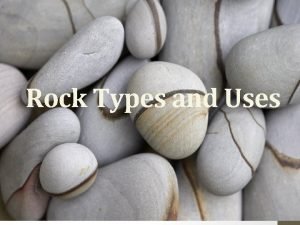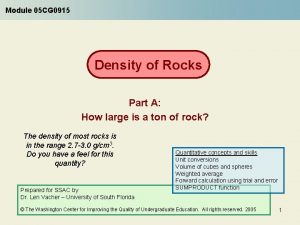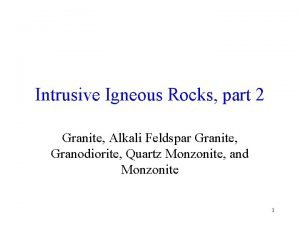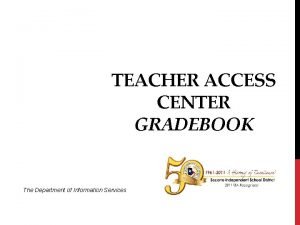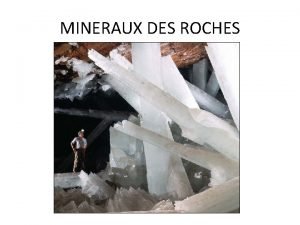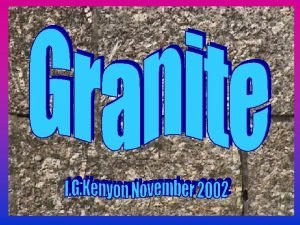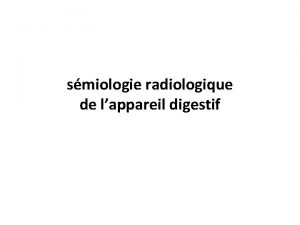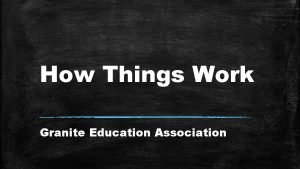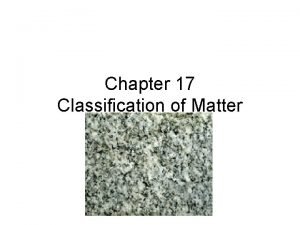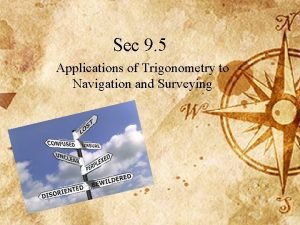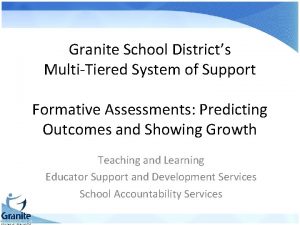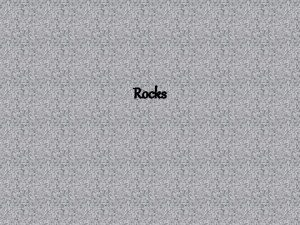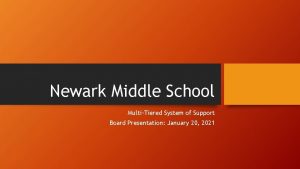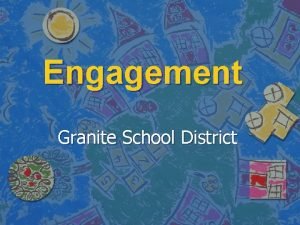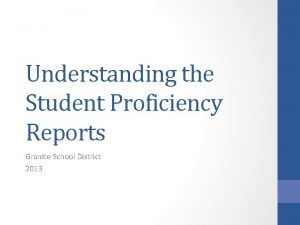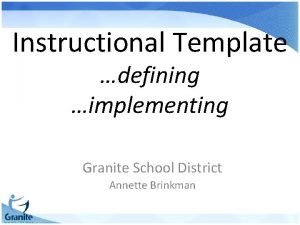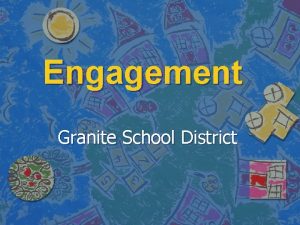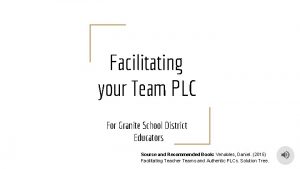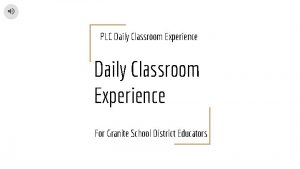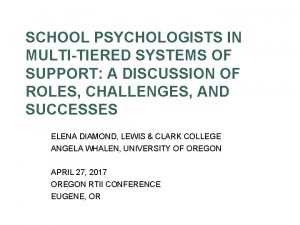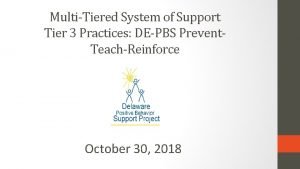Granite School District MultiTiered System of Support Part





























- Slides: 29

Granite School District Multi-Tiered System of Support Part I: Moving Between Tier 1 Differentiation and Tier 2 Interventions and Extensions Teaching and Learning Educator Support and Development Services School Accountability Services

Superintendent’s “Game Changer” “The state core curriculum is the expectation. You don’t teach to the test, you teach what is expected to be learned-the state core. ” Superintendent Bates “The tools we have to help us are…” • • Instructional framework Curriculum maps Pacing guides Lesson design template Formative assessments Emphasis concepts MTSS Asst. Superintendent Linda Mariotti

Why Intervention/Extension? “It is essential that we as educators become responsive to the needs of all our students sitting in front of us every day. Our schools and our students will benefit by systematically and strategically providing effective instruction, feedback, and early intervention strategies. ” --Karns and Johnson (2011)

Objectives Content Objective: Learners will clarify their understanding of the connection between Tier 1 Differentiation and Tier 2 Intervention/Extension. Language Objective: Learners will reflect on current practices, watch a video, and share implementation ideas.


Small Group Differentiation and Supplemental Intervention/Extension

MTSS Definition of Differentiation in Tier 1 Small Group Differentiation • Tier I small group targeted instruction is a component of core instruction • Differentiate based on • On-level instruction • Re-teaching for struggling students • Extensions for advanced students • Allows for the disparity (above/on/below grade level) of needs of individual students • Provides instruction for individuals and groups of students • Uses strategies, accommodations, resources, materials, sequencing, technical tools, and demonstrations of learning (checks for understanding)

MTSS Tier 2 Intervention & Extension Supplemental Tier 2 Intervention and Extension • Small group instruction (designed for 15% of students) • Does not supplant Tier I instruction • Interventions/extensions match the needs of students identified as at-risk or advanced • Targeted in Focus, Time and Intensity • Provided by knowledgeable and skilled school personnel (Additional supports may be required)

GMTSS Critical Components Chart

GMTSS Critical Components Reflection GMTSS Critical Components Chart Tier 1 Your School's Examples Polishers/Keepers Tier 2 Your School's Examples Polishers/Keepers All students in the classroom Targeted students whose data suppport that Tier 1 instruction is not sufficient to meet their needs Research-based curricula are used with fidelity. Data should document instruction beyond presenting to middle of class Research-based programs implemented with fidelity that are designed to supplement regular classroom instruction and focused on targeted skills Focus Program Grouping Time Multiple grouping formats to meet individual student needs through differentiated instruction such as whole group, small group and individual Homogeneous small group instruction (typically no more than 5 -7 students per adult in a group) 180 minutes or more per day of core instruction in literacy and 90 minutes daily in mathematics Multiple times per week in small group in addition to Tier 1 instruction, typically for a minimum of 20 -30 minutes Ongoing checks for understanding, Common formative assessments, Mastery benchmark assessments (Acuity Benchmark, Content Mastery Benchmarks), Universal Screening Assessment (Acuity Progress, DIBELS, SRI) Progress monitoring at least every two weeks on deficient skills to ensure adequate progress and facilitate necessary adjustments to intervention based on data (Acuity Progress, DIBELS, AIMSweb, other) General Education Teacher Determined by the school (may be classroom teacher, specialized teacher, or paraprofessional) General Education Classroom Depends on space and structure at the school level Assessment Who Does It? Where Does It Happen?

Learning Task 1 • Review the definitions of Tier 1 differentiation and supplemental Tier 2 intervention/extension along with the GMTSS Critical Components Chart • On the back of the GMTSS chart, write examples of how this looks in your school. Include both polishers and keepers. • We will share some examples in 5 minutes.

Video: Questions to Ponder 1. In what ways does the teacher check for understanding during the lesson? 2. What examples of differentiation do you notice during the lesson?

Differentiated (Tiered) Exit Cards: Day 1 • Differentiated Exit Cards in Math

Video: Questions to Ponder 1. In what ways does the teacher check for understanding during the lesson? 2. What examples of differentiation do you notice during the lesson?

Graphs

Differentiated (Tiered) Exit Cards: Day 2 • Do you think the second day of instruction shown in this video is an example of Tier 1 differentiation or Tier 2 intervention? Why? Use examples from the video in discussing your answer.

Differentiated (Tiered) Exit Cards: Day 2 • Differentiated Exit Cards in Math

Differentiated (Tiered) Exit Cards: Day 2 • Do you think the second day of instruction shown in this video is an example of Tier 1 differentiation or Tier 2 intervention? Why? Use examples from the video in discussing your answer.

Learning Task 2 Hypothetical Situation (based on video): • A teacher uses the teaching strategies demonstrated in this video for one week • At the end of that week – 26 students have the concept – 3 had it from the start – 6 still don’t get it (1 SWD, 2 ELL, 3 peers) • The concept is a prerequisite for next math concept being taught Problem Solve: • What will the teacher do next to intervene/extend for students?

Small Group Differentiation and Supplemental Intervention/Extension Problem Solve: What will the teacher do next to intervene/extend for students?

Learning Task 3 • At your table, discuss the elements of intervention and extension • In 5 minutes we will share out

What is an Intervention? • It is planned instruction using data. • It is sustained over time. • It is targeted or focused on a particular student/group and on a particular set of skills or knowledge. • It is goal oriented (using baseline data) • It is procedural.

What is an extension? • It is based on assessment data to identify exceptional learning needs • It is instruction that extends academic standards into the depth and complexity of the curriculum area • It incorporates advanced, in-depth, and complex content, processes, and products • It provides cognitively complex learning • It is conducted with like ability peers

What supports do we need to implement effective interventions/extensions? • Awareness/consensus-buy in • Infrastructure (systemic supports, scheduling, team problem-solving, professional learning, etc. ) • Implementation (strategies, assessment, data collection and interpretation/analysis, instructional programming) • Evaluation of effectiveness • Refine, improve, extend

Take Away • • • Between now and next MTSS, identify good examples of Tier 1 small group differentiation and examples of Tier 2 interventions/extensions based on the GMTSS critical components Send examples of these to share at March MTSS to Mary Alice (e. g. , written descriptions, videos, pictures, QR link) NEED ALL LEVELS Those who send examples get 10 extra raffle tickets for end of year Grand Raffle

Exit Card • Please fill out the tiered exit card with your reflections on today’s MTSS presentation.

Objectives Content Objective: Learners will clarify their understanding of the connection between Tier 1 Differentiation and Tier 2 Intervention/Extension. Language Objective: Learners will reflect on current practices, watch a video, and share implementation ideas.

Resources • www. differentiationcentral. com • www. teachingchannel. org • www. readwritethink. org

Thank You! See you next month on March 20 th
 Granite school district calendar
Granite school district calendar Granite teacher support
Granite teacher support Granite gradebook login
Granite gradebook login Jones center granite school district
Jones center granite school district Granite oaks middle school
Granite oaks middle school Granite bay grizzlies football
Granite bay grizzlies football Granite bay high school football
Granite bay high school football Lodi summer school
Lodi summer school Iswk uniform
Iswk uniform Scranton school district
Scranton school district Roles and responsibilities of district-based support team
Roles and responsibilities of district-based support team School based teacher support system
School based teacher support system Major and minor supporting details examples
Major and minor supporting details examples Site:slidetodoc.com
Site:slidetodoc.com Basalt and granite difference
Basalt and granite difference Density rock
Density rock 3 main characteristics of metamorphic rocks
3 main characteristics of metamorphic rocks Minerals in granite
Minerals in granite Scottsdale senior center
Scottsdale senior center How can a large block of granite form layers like an onion?
How can a large block of granite form layers like an onion? Gradebook granite
Gradebook granite Substance
Substance Serie bowen
Serie bowen Gravestones truro
Gravestones truro Asp debout ou couché
Asp debout ou couché Gea utah
Gea utah Granite classification of matter
Granite classification of matter Granité post hemoptoique
Granité post hemoptoique Weathering types
Weathering types Applications of trigonometry in navigation
Applications of trigonometry in navigation
